Nigeria’s Minister of Finance and Coordinating Minister of the Economy, Mr. Wale Edun, has said that the increase in Nigeria’s revenue recorded in the 2024 fiscal year is being strategically allocated to various social intervention programmes aimed at improving the living standards of citizens and addressing pressing societal needs.
Speaking at a panel session titled ‘Fiscal Reforms for a More Secure Future’ during the 30th Nigeria Economic Summit in Abuja on Tuesday, the Nigerian minister said that the social investment programme was targeted to impact 60 per cent of the poorest, reaching 20 million persons.
He also spoke on the proposed comprehensive agenda for Nigeria’s economic reform, which aims to reduce inflation, create jobs and stimulate growth in key sectors of the economy.
Edun disclosed that increased revenue is primarily being used to finance social programmes to mitigate the impact of essential but challenging reforms that have affected the cost of living.
“In terms of revenue, the number one place to look was inwards, domestic resource mobilisation. That’s where the government started. By the first half of this year, revenue had doubled.
“Aggregate government revenue was more than doubled. And that was achieved by applying technology very robustly.
“We have applied technology in a way that essentially reforms the civil service. Rather than waiting for compliance from government ministries, departments and agencies and government companies, we looked at what the rules and regulations were, how much a company was allowed to spend on its revenue, and then how much of its surplus it had to provide to government.
“The social investment programme is spearheaded by direct transfers to reach 60 per cent poorest in the population. And right now, 20 million households are being supported directly. And it’s going to rise to, well, 20 million people, four million households so far, and it will rise to 15 million households who will be paid directly by the government,” he said.
Edun explained that the government is focusing on agriculture, manufacturing, oil, and housing as vital drivers of the Nigerian economy.
“We are looking at food production to help bring down inflation,” he said, adding: “We aim to make food more available, affordable, and to reduce the cost of living for Nigerians.”
GIK/APA


